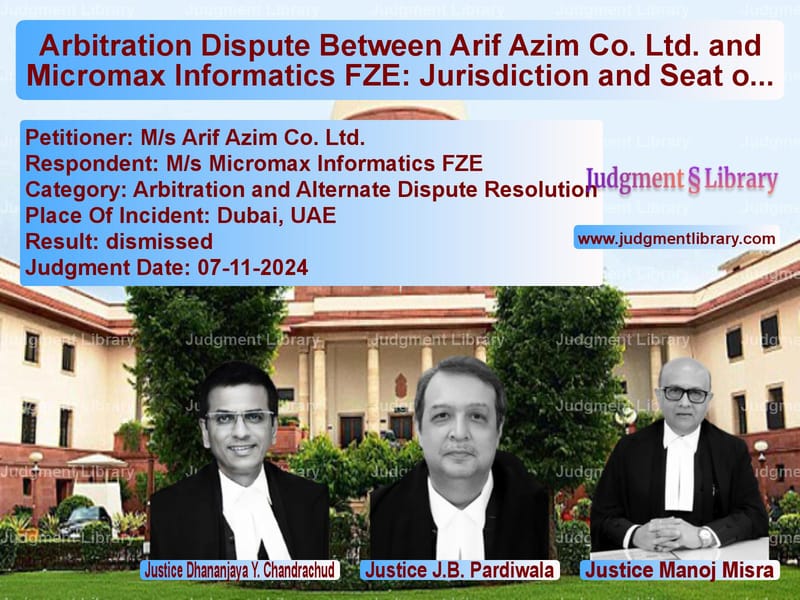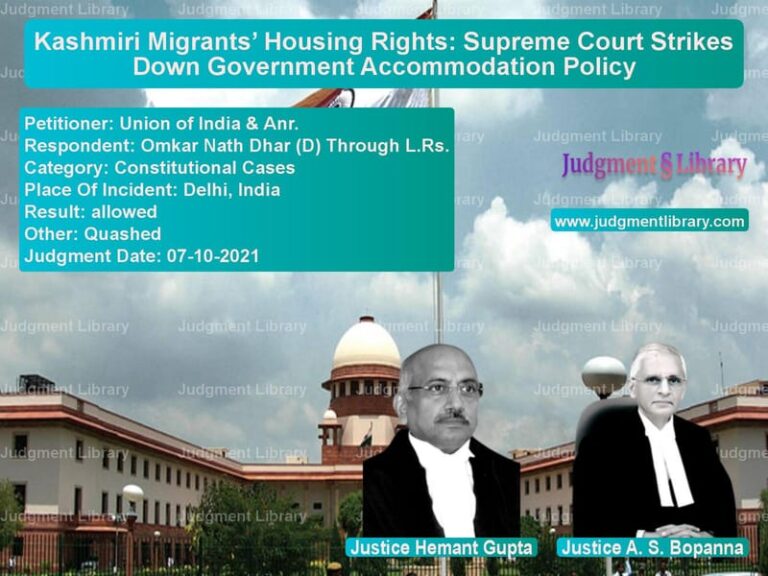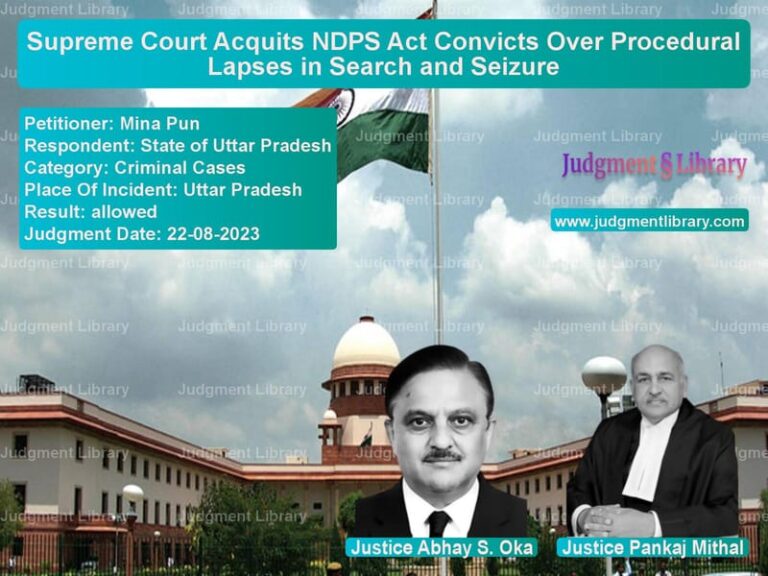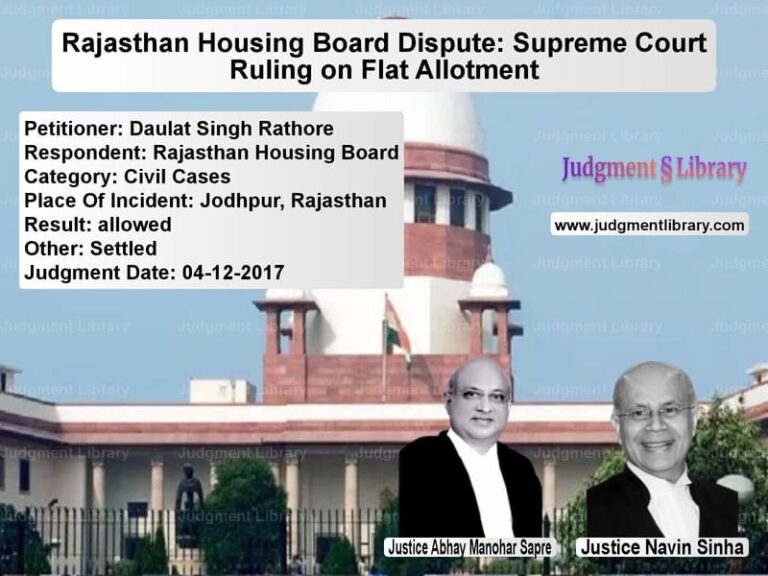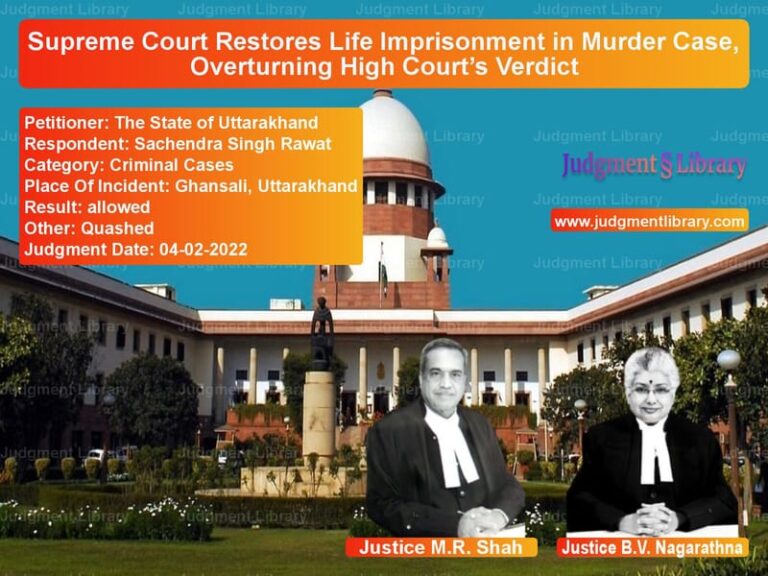Arbitration Dispute Between Arif Azim Co. Ltd. and Micromax Informatics FZE: Jurisdiction and Seat of Arbitration
The Supreme Court of India recently ruled in a case concerning the jurisdiction and enforcement of an arbitration agreement between M/s Arif Azim Co. Ltd. (Petitioner) and M/s Micromax Informatics FZE (Respondent). The core issue revolved around whether Indian courts had jurisdiction to appoint an arbitrator under Section 11 of the Arbitration and Conciliation Act, 1996, or if the agreement’s arbitration clause, specifying Dubai as the seat, excluded Indian courts.
Background of the Case
On November 9, 2010, Arif Azim Co. Ltd. entered into a Consumer Distributorship Agreement with Micromax Informatics FZE for the sale and distribution of Micromax mobile handsets in Afghanistan. Under the agreement, all transactions were required to be settled with Micromax Informatics FZE, and disputes were to be resolved through arbitration.
The petitioner alleged that payments were made to Micromax India instead of Micromax Informatics FZE and claimed that outstanding amounts and invoice discrepancies remained unresolved. The dispute escalated, leading Arif Azim Co. Ltd. to seek the appointment of an arbitrator through the Indian courts.
Legal Issues Raised
- Whether the arbitration clause, specifying Dubai as the seat of arbitration, prevented Indian courts from exercising jurisdiction.
- Whether the agreement’s reference to the “non-exclusive jurisdiction of Dubai courts” allowed concurrent jurisdiction in India.
- Whether Part I of the Indian Arbitration and Conciliation Act, 1996, applied to an arbitration agreement with a foreign seat.
- Whether Micromax Informatics FZE’s lack of response to arbitration invocation justified intervention by Indian courts.
Arguments by the Petitioner (Arif Azim Co. Ltd.)
- The arbitration agreement did not specify an exclusive seat; it merely stated that disputes would be resolved under UAE law, without explicitly excluding Indian courts.
- The agreement’s mention of Dubai’s “non-exclusive jurisdiction” meant that Indian courts could still exercise jurisdiction over the dispute.
- The transactions in question involved India, Afghanistan, and Dubai, with substantial business operations in India, making it reasonable for Indian courts to appoint an arbitrator.
- The respondent had failed to respond to arbitration notices, necessitating judicial intervention.
Arguments by the Respondent (Micromax Informatics FZE)
- The arbitration clause clearly stated that disputes would be governed by UAE law and resolved in Dubai, making Dubai the seat of arbitration.
- The Supreme Court’s ruling in Bharat Aluminium Co. v. Kaiser Aluminium Technical Services Inc. (BALCO) established that once a foreign seat is designated, Indian courts cannot intervene.
- The agreement’s “non-exclusive jurisdiction” clause referred to substantive legal matters, not arbitration jurisdiction.
- Part I of the Indian Arbitration Act does not apply to foreign-seated arbitrations unless expressly agreed upon, which was not the case here.
Supreme Court’s Observations
The Supreme Court carefully examined the arbitration clause and previous case law, highlighting key legal principles:
- Designation of a foreign seat carries exclusive jurisdiction, barring Indian courts from appointing an arbitrator.
- The reference to “non-exclusive jurisdiction” of Dubai courts pertained to substantive disputes, not arbitration jurisdiction.
- Part I of the Arbitration Act does not apply to foreign-seated arbitrations unless expressly stated, which was absent in this case.
- Since Dubai was designated as the seat, the governing law for arbitration was UAE law, not Indian law.
The Court emphasized:
“Once parties designate a foreign seat, the supervisory jurisdiction vests in the courts of that country. Indian courts cannot override this designation under Section 11 of the Arbitration Act.”
Precedents Considered
The Court referenced multiple precedents:
- Bharat Aluminium Co. v. Kaiser Aluminium Technical Services Inc. (BALCO) (2012): Confirmed that a foreign seat excludes Indian jurisdiction unless otherwise agreed.
- Roger Shashoua v. Mukesh Sharma (2017): Established that a designated seat confers exclusive jurisdiction to that country’s courts.
- Hardy Exploration and Production (India) Inc. v. Union of India (2018): Clarified that “seat” and “venue” are distinct, and an express foreign seat excludes Indian courts.
Final Judgment
The Supreme Court ruled:
- The arbitration agreement between the parties designated Dubai as the seat, giving Dubai courts exclusive jurisdiction.
- Indian courts have no jurisdiction to appoint an arbitrator under Section 11 of the Arbitration Act.
- Part I of the Indian Arbitration Act does not apply to this case, as there was no express agreement to the contrary.
- The petition for appointing an arbitrator in India was dismissed.
The Court concluded:
“A clear foreign seat in an arbitration agreement ousts the jurisdiction of Indian courts. Intervention by Indian courts would amount to judicial overreach and must be avoided.”
Impact and Significance
This ruling strengthens India’s pro-arbitration stance and reinforces the principle that:
- Once a foreign seat is designated, Indian courts cannot intervene.
- Businesses entering into cross-border contracts must carefully negotiate and understand arbitration clauses.
- Judicial overreach in foreign-seated arbitrations undermines India’s commitment to international arbitration norms.
- Parties should ensure clarity in arbitration clauses to avoid jurisdictional disputes.
Conclusion
The Supreme Court’s decision in Arif Azim Co. Ltd. v. Micromax Informatics FZE serves as a landmark judgment clarifying India’s stance on foreign-seated arbitration. By upholding Dubai as the designated seat and dismissing the petition, the Court reaffirmed its commitment to enforcing international arbitration agreements while preventing unnecessary judicial intervention in foreign-seated disputes. The ruling will guide businesses engaging in cross-border transactions and strengthen India’s credibility as an arbitration-friendly jurisdiction.
Petitioner Name: M/s Arif Azim Co. Ltd..Respondent Name: M/s Micromax Informatics FZE.Judgment By: Justice Dhananjaya Y. Chandrachud, Justice J.B. Pardiwala, Justice Manoj Misra.Place Of Incident: Dubai, UAE.Judgment Date: 07-11-2024.
Don’t miss out on the full details! Download the complete judgment in PDF format below and gain valuable insights instantly!
Download Judgment: ms-arif-azim-co.-lt-vs-ms-micromax-informa-supreme-court-of-india-judgment-dated-07-11-2024.pdf
Directly Download Judgment: Directly download this Judgment
See all petitions in Arbitration Act
See all petitions in International Arbitration
See all petitions in Enforcement of Awards
See all petitions in Dispute Resolution Mechanisms
See all petitions in Institutional Arbitration
See all petitions in Judgment by Dhananjaya Y Chandrachud
See all petitions in Judgment by J.B. Pardiwala
See all petitions in Judgment by Manoj Misra
See all petitions in dismissed
See all petitions in supreme court of India judgments November 2024
See all petitions in 2024 judgments
See all posts in Arbitration and Alternate Dispute Resolution Category
See all allowed petitions in Arbitration and Alternate Dispute Resolution Category
See all Dismissed petitions in Arbitration and Alternate Dispute Resolution Category
See all partially allowed petitions in Arbitration and Alternate Dispute Resolution Category

